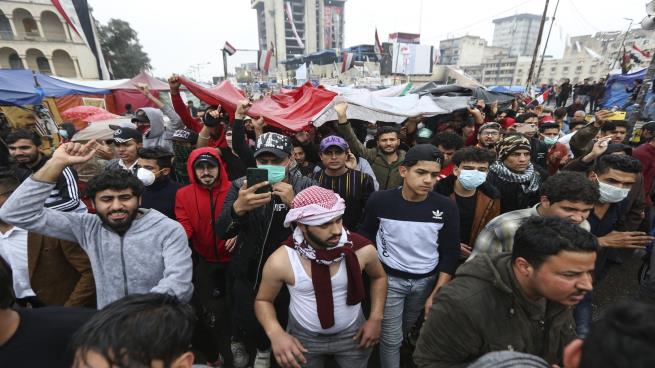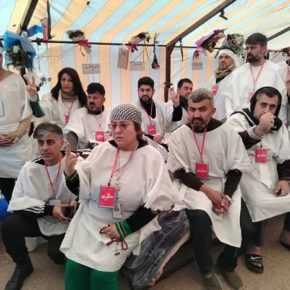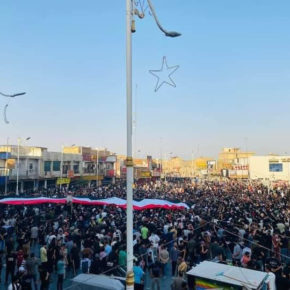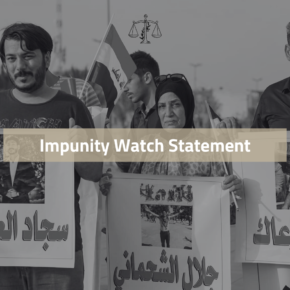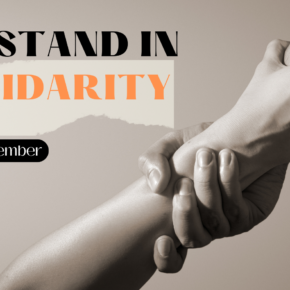Clashes Result in 2 Martyrs and Dozens Wounded
Baghdad – Bara Al-Shammari, Salam Al-Jaf
25 February 2020
Clashes between Iraqi demonstrators and Iraqi security forces in the capital Baghdad caused the death of two people and left more than 50 wounded. “Riot police” tried to compel peaceful protesters to move from Al-Khilani Square and go towards Tahrir Square, using live bullets and tear gas canisters against the demonstrators, some of whom refused to leave. Activist Mohamed Hussein endured several stab wounds from knives wielded by unknown men, when he left his tent in Tahrir Square, he was then transferred to a nearby hospital.
Meanwhile, the night protests continued in Tahrir Square as the demonstrators called again for the dissolution of parliament and early parliamentary elections. They will refuse to recognize the government of Muhammad Tawfiq Allawi if the current parliament votes on it at its special session scheduled for Thursday, 27 February 2020
The Al-Haboubi Square in the city of Nasiriyah in Dhi Qar is filled with thousands of demonstrators who confirmed that their protest movement will continue regardless of the vote on the government of Muhammad Tawfiq Allawi, indicating that the public squares where demonstration are taking place will not accept any candidate supported by the current political parties.
The united voices of the Al Habboubi protesters indicated further that the danger of an outbreak of the new Corona virus will not deter them from continuing to demonstrate until they obtain the rights they deserve.
Similarly, Al-Ahrar Square in Karbala was filled with peaceful protesters who declared an ongoing commitment to their initial demands, demands which were rejected by what they describe as the “government of the parties” which is on its way to being formally confirmed. Together these demonstrators stress that their protests will continue with acts of peaceful resistance aimed at removing the ruling class from power.
On Tuesday, 25 February, still more demonstrations took place in the city of Diwaniyah (the center of Qadisiyah governorate) in response to calls by activists to organize large protests. The peaceful demonstrators chanted together, condemning the corruption endemic to political parties over the past years.
In the city of Kut, in Wasit governorate, peaceful demonstrations involving hundreds of people took place in streets throughout the city; protesters roamed the city carrying large Iraqi flags and banners calling on the government to respond to the protests that are about to finish their fifth consecutive month.
A peaceful march also started from Dinar Street in Basra, heading towards the city’s main public square where demonstrations are already taking place.
Meanwhile, local media reported a letter attributed to the media department of the Iraqi parliament which called on the public prosecutor to take immediate legal measures regarding what Prime Minister-designate Muhammad Tawfiq Allawi claimed was “a plan to thwart the government’s confirmation by paying exorbitant sums to deputies.” Whether or not this is true, a proper legal investigation must occur in accordance with Iraqi law.
Member of parliament, Basma Basim, commented on Allawi’s accusations to the deputies, saying in a tweet, “Mr. Muhammad Allawi, putting aside our conviction that you are not qualified to manage this country, in your tweet you have accused the parliament falsely, and in doing so, you have proven that you do not understand the basics of state administration.”
Also responding to Allawi’s accusation on Twitter, Yahya al-Muhammadi, another member of parliament, called on the public prosecutor to open an investigation into Allawi’s claim that there are concerted efforts to keep him from taking office, “Continued theft of seats will be impossible because the ministries will be run by independent ministers,” he said. .
On 2 February, Iraqi President Barham Salih appointed Muhammad Tawfiq Allawi to form a new government; this was necessary after the resignation of Adel Abdul Mahdi’s government at the end of November 2019. Mahdi’s resignation was the direct result of the popular protests that broke out in the country a month earlier. According to the deadline set out in the constitution, Allawi must submit his proposed government to parliament by Monday, 2 March 2020.
The leader of the “patriotism” coalition, Iyad Allawi, announced his support for Tuesday’s demonstrations, confirming in a tweet that “the determination of the masses that came out today, despite the continued campaign of repression and intimidation, have made it clear that burying the revolution is off the table, as are any settlements benefitting by political dealers concerned with their own position and personal gains.”
He went on, giving his full support to those peacefully protesting: “I congratulate you for your steadfastness as you create the bright Iraq of tomorrow, and I highlight the shame and disgrace of those who attack you. We will remain firm and determined in response to any attempted aggression.”
Meanwhile, local media have reported that Imad Baglan, a member of the Kurdistan Democratic Party, has accused “Shiite” parties, which he did not name, of being behind the protests which recently took place in the Kurdistan region. Baglan is reported to have said: “He who calls for demonstrations in the Kurdistan region and tries to create confusion has received payment from some Shiite parties who have their own agenda,”,noting further that “the loyalties of the person calling for demonstrations in the region is known.”
Baglan went on to point out that the health, education and basic services in cities of the Kurdistan Region are of a higher quality than those in other Iraqi governorates.
On Monday, 24 February, the Sulaymaniyah governorate witnessed demonstrations against the power and corruption of political parties in the region, causing occasional economic crises within Kurdistan.
Earlier this month, the head of the Kurdish “New Generation” movement, Shaswar Abdul Wahid, called for peaceful protests in the cities within the Kurdistan region, similar to those taking place Baghdad and the southern governorates since the beginning of October 2019.

